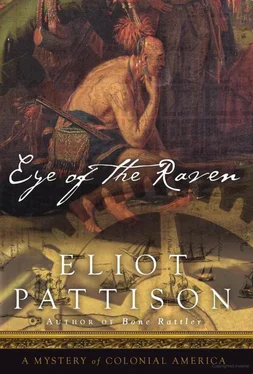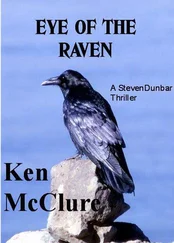Eliot Pattison - Eye of the Raven
Здесь есть возможность читать онлайн «Eliot Pattison - Eye of the Raven» весь текст электронной книги совершенно бесплатно (целиком полную версию без сокращений). В некоторых случаях можно слушать аудио, скачать через торрент в формате fb2 и присутствует краткое содержание. Год выпуска: 2010, ISBN: 2010, Издательство: Counterpoint Press, Жанр: Исторический детектив, на английском языке. Описание произведения, (предисловие) а так же отзывы посетителей доступны на портале библиотеки ЛибКат.
- Название:Eye of the Raven
- Автор:
- Издательство:Counterpoint Press
- Жанр:
- Год:2010
- ISBN:9781582437019
- Рейтинг книги:5 / 5. Голосов: 1
-
Избранное:Добавить в избранное
- Отзывы:
-
Ваша оценка:
- 100
- 1
- 2
- 3
- 4
- 5
Eye of the Raven: краткое содержание, описание и аннотация
Предлагаем к чтению аннотацию, описание, краткое содержание или предисловие (зависит от того, что написал сам автор книги «Eye of the Raven»). Если вы не нашли необходимую информацию о книге — напишите в комментариях, мы постараемся отыскать её.
Eye of the Raven — читать онлайн бесплатно полную книгу (весь текст) целиком
Ниже представлен текст книги, разбитый по страницам. Система сохранения места последней прочитанной страницы, позволяет с удобством читать онлайн бесплатно книгу «Eye of the Raven», без необходимости каждый раз заново искать на чём Вы остановились. Поставьте закладку, и сможете в любой момент перейти на страницу, на которой закончили чтение.
Интервал:
Закладка:
"When we are done," Rideaux declared, "we will make a great library to memorialize the Iroquois civilization."
"Civilization?" Macklin's expression was skeptical.
The doubt in his tone brought color to Rideaux's face. "You come to make them dream of the savior's blood, but in the end you would put chains on them as real as those this poor girl's family wears. In a hundred hundred ways the Europeans make them feel inferior, when it is we who should feel inferior to them for their uncorrupted souls."
"The lambs of God enter his flock from many paths," Macklin observed.
"I once gave last rites to an old Mohawk woman," Rideaux shot back. "She said she knew she was going to hell. I asked why she would say such a terrible thing, and she said white people always said so, and they were the ones who could read words, the ones who would know such things."
The former priest paused, surveying his uneasy audience, then lifted a small wooden chest, a traditional Bible box, from the mantel over the fireplace. He produced a key from his pocket, opened it, and began to lay tattered papers on the table. " 1705," he said. "A letter from the governor of Pennsylvania assuring the Nanticoke tribe perpetual use of the lands along the Susquehanna below here. Today it becomes crowded with settlements. 1720," he continued, lifting another paper. "A Quaker deed purporting to show that the Delawares ceded them a huge tract at the Forks of the Delaware, though the Delawares insist they never signed such a document." He lifted one more sheet from the box. "Someone in Lancaster gave a Conestoga family this in exchange for half their corn crop, saying it would assure them safe passage through all European lands forever. It is nothing but a receipt for a wagonload of lumber, but they didn't know. They treasured it, kept it protected, wrapped in a sacred wampum belt for twenty years. An old Iroquois once told me all the storms and wars of the past century cause but minor troubles compared to the devastation done by the pens of the colonists. By quill and ink we commit the sins that break the souls of these noble people. We share the same shapes, but the hearts of Europeans and Indians are as of different creatures."
"These noble people," Hadley asserted in a near whisper, "have slaughtered thousands of settlers. Witnesses have seen them cut out the hearts of living men and eat them."
"The ways of the forest are absolute. You may as well condemn the bear for his claw or the lion for his fang. They may draw the blood of a few of us, but we draw the words that deny their entire race their future. Is this what eighteen centuries of Christ has meant? That the country with more power has the sacred right to destroy the lesser?" Rideaux leveled his gaze at Duncan. "McCallum is a Highland name. Where is your clan today?" he asked pointedly.
Duncan shook his head. "There is no man here who is an enemy of the tribes."
"Then stop interfering."
"With what?" Duncan demanded. "Your secret protection of runaway slaves? Your efforts to keep Europeans from aiding the Indians? Murder of innocent men on the Warriors Path? The unnecessary hanging of a chief desperately needed by his people? Those behind the murders are seeking to make it appear Shamokin Indians are behind them. Your Indians in fact, for the killers are using the slaves you give shelter to, leaving clock gears behind. You would have us not interfere with the mob that will surely come looking to spill Indian blood? They will start here, I tell you. They will annihilate this settlement. And your compound will be the spark that ignites the flame."
"You understand nothing."
"I understand your notions of societies and civilization in the great frame of history are more important to you than the deaths of innocents here and now."
Rideaux's eyes flared again. "In that case, Scotsman, you do begin to understand me." As he spoke the Frenchman looked toward the window, sudden worry on his face.
The sound outside had been growing steadily louder, nagging at Duncan's subconscious, until suddenly it broke through. Conawago cocked his head then darted outside with Rideaux. Duncan was a step behind. The Frenchman cursed as he saw the yard had been emptied, and he cursed louder as he seemed to recognize the din rising from the other side of the ridge. Reverend Macklin and Moses pushed past, running toward town. The screaming, the musket shots, the frenzied whooping were unmistakable. The battle Duncan had dreaded had already arrived.
Rideaux darted back into the house, fear shining in his eyes now. "Tewaarathon!" he shouted at the Indians still inside. "Make ready!"
CHAPTER NINE
Duncan ran behind the men from Rideaux's compound, watching with horror as they stripped off unnecessary clothing, pulling knives and war axes from their belts. It had begun. There would be no treaty, no saving Skanawati. The Frenchman sprinted past, carrying bandages, murmuring what could have been a frantic prayer. The men ahead of them reached a low rise above one of the wide fields, and with a collective cry the Indians leapt to the fray. Tewaarathon! Rideaux had shouted. War!
Duncan checked the powder in his frizzen pan, saw Hadley and Van Grut do the same as they arrived panting at his side, then looked to the field in confusion. The Indians who had been with him were not charging into the melee below but instead were running toward a group of women and children at one end of the long rectangular field. Duncan hesitated. Tewaarathon. It meant more than war. Brother and war. Not just brother, but younger brother.
The Indians threw down their weapons onto a blanket already stacked high with other weapons. In exchange each grabbed a long crooked stick with netting woven from the tip of the crook to a point nearly halfway down the shaft. Every man on the field held such a stick, and at the center of the battle, they fought over a small leather ball.
"It is for good reason the Iroquois call it Little Brother of War," Macklin said as he reached Duncan, carrying more bandages. "There are full battles with fewer casualties."
"Tewaarathon is a game?" Duncan asked incredulously.
"That is the Mohawk name for it. The Onondaga say dehuntshigwa es, which translates as man hitting a round thing. Fortunately this is just an impromptu practice. Later in the year, especially after the crops come in, there will be lacrosse gamesthat is the French name-played all day, or even over several days." As he spoke a dozen men leapt onto the man with the ball. When the knot cleared two men lay moaning on the ground.
"What are the rules?" Hadley asked, the confusion on his face replaced by a budding excitement.
"Few enough," Macklin said. "The opposing team must get the ball to your goal to score. The goals today are those old stumps-" the Moravian pointed to two large stumps at either end of the field, more than a hundred yards apart. "They may never hold the ball. They scoop it and carry it in the racquet or with their legs and feet, and the other side tries to stop them using only their bodies or their racquets."
"There're Europeans!" Van Grut exclaimed, pointing to a score of pale-skinned men with their shirts off at the far end of the field.
"Nearly every able-bodied man beneath the age of forty plays. Today it looks like the Iroquois against the smaller tribes and the Europeans."
"Those men on the ground," Duncan said, indicating the two victims of the last pile-on. "They need help."
"Not likely. Mostly the only thing that stops a player is a broken bone." Macklin cast a worried eye toward the tavern. "Afterward the ale will flow for hours." As if on cue the two men on the ground, one pale with red hair, staggered up and set off a slow, limping trot toward the mob that surrounded the ball. More men went down, some leveled by vicious blows to the knees or ribs with opposing racquets, others downed by deliberate collisions that would fell a horse. Still, Duncan could see no rancor on the players' faces, only a spirited joy.
Читать дальшеИнтервал:
Закладка:
Похожие книги на «Eye of the Raven»
Представляем Вашему вниманию похожие книги на «Eye of the Raven» списком для выбора. Мы отобрали схожую по названию и смыслу литературу в надежде предоставить читателям больше вариантов отыскать новые, интересные, ещё непрочитанные произведения.
Обсуждение, отзывы о книге «Eye of the Raven» и просто собственные мнения читателей. Оставьте ваши комментарии, напишите, что Вы думаете о произведении, его смысле или главных героях. Укажите что конкретно понравилось, а что нет, и почему Вы так считаете.












